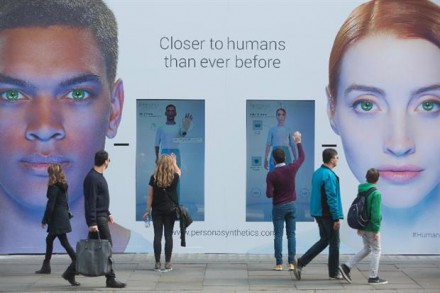Tuesday 6 October, 2015
6:30 for a 7:00 pm start, finishing at 21:00
De Santis 11-13 Old Street (near junction with Goswell Road)
London EC1V 9HL
[Map]

The theme of automation, robotics, artificial intelligence and employment has come to the fore in the last year — highlighted by books such as Brynjolfsson and Andrew McAfee’s ‘The Second Machine Age’, the current BBC season on Intelligent Machines, the movies ‘Ex-Machina’ and Channel 4’s drama ‘Humans’ (illustrated), and high profile debates in fora such as Intelligence Squared — and has elicited much commentary.
The key developments driving the current debate are increases in computing power and connectivity, improvements in machine learning, access to data to learn from, and progress in sensors and actuators.
Concerns range from the threat to low paid and white collar jobs and the possibility of another shake-out of manufacturing jobs, to increasing economic disparities, the challenges of working with autonomous robots, the impact on the Chinese and other high growth economies, and the ethics and legal ramifications of interacting with robots. These commentators cite Moore’s Law as if it directly maps to the rate of societal change, and all change is described as ‘exponential’. The concepts around business and economics are rarely interrogated in a meaningful way; neither are the collective responses of workers, nor the infrastructural implications of developments considered; while social and legal ramifications tend to be skated over. Previous related hysteria – from automation in the 60s to robots in manufacturing in the 80s – are rarely reflected upon with respect to how they worked out in reality.
On the other hand many question the scale of developments — not least having reviewed the statistics on usage of robots and related productivity — questioning the scenarios envisioned and the naivety of understanding of the replication of human skills; some take on the mapping of technical to social change; others see robots as complementary to workers, observing that past periods of rapid automation still lead to increases in employment and quality of life, and argue that distinct humans qualities will guarantee future employment. In both camps – our speaker James Woudhuysen excepted – there is a general sense that technology drives society, and we’re just to be carried along. Explanations lack application of real theory or presentation of new paradigms. And few question how, when we are innovating and becoming more efficient, we seem so dystopic about our economic, work and lifestyle futures.
If you want to contribute to this debate, please join us for an informed high-level and frank discussion on the future of automation and employment, and how we can shape it.
If you would like to take part please book via Eventbrite, where you can also add the event to your calendar and find a map locating the venue.
(There is a cost to take part in this discussion, to cover the costs of food and refreshments.)
The discussion will be introduced by James Woudhuysen, BIG POTATOES manifesto co-author and editor, visiting professor at London South Bank University, and an early writer and researcher on robots.
Discussions are attended by around 15 people, and a reading list can be found on the event page. Following the model of the previous discussion, we will be encouraging participants to write-up their conclusions; we will also be discussing in what forms we might collectively communicate our insights.
Trackbacks
One Trackback